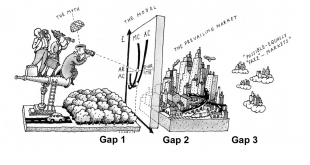I finished Branko Milanovic's thought provoking Capitalism Alone this summer. But I haven't had much time to write on the blog, as you might have noticed. This is certainly not a review, and I would definitely suggest that you go and buy the book as soon as you can and read it. It is a serious discussion of the future of capitalism, that word that, as Heilbroner often reminded us, was at the center of the discipline, but seldom discussed openly by economists. He cited, if memory doesn't fail...
Read More »The Unreal Basis of Neoclassical Economics
By Al Campbell, Ann Davis, David Fields, Paddy Quick, Jared Ragusett and Geoffrey Schneideroriginally posted hereIntroduction Ten years after the financial crisis, we still find mainstream economists engaging in overly simplistic analysis that does not accurately capture the dynamics of the real world. People studying economics need to know that the principles of mainstream economics are hopelessly unrealistic. In this short article, we demonstrate that the ten principles of...
Read More »Mankiw’s Mythical Ten Commandments of Theoclassical Economics
By William K. BlackMay 16, 2016 Bloomington, MN This is the second column in a series on the N. Gregory Mankiw’s myths and dogmas that he spreads in his economic textbooks. The first column exposed the two (contradictory) meta-myths that begin his preface. This column de-mythologizes Mankiw’s unprincipled “principles” of economics – the ten commandments of theoclassical economics’ priestly caste. Some of these principles, correctly hedged, could be unobjectionable, but in each case...
Read More »The Unprincipled and Mythical Mankiw Principles of Economics
By William K. BlackMay 15, 2016 Bloomington, MN In this first installment I discuss the unacknowledged contradiction that lies at the core of the two meta-myths in the preface to N. Gregory Mankiw’s textbooks. Mankiw is among the leading providers of introductory economics textbooks. In his preface to these volumes he preaches his first meta-myth in his first substantive sentence about economics. Economics combines the virtues of politics and science. It is, truly, a social science....
Read More »Stop Calling Deals That Help CEOs Pillage with Impunity “Free Trade”
By William K. BlackMay 14, 2016 Bloomington, MN This is the second column in my series on the “Mankiw’s myths and Mankiw morality.” In the first column I showed that N. Gregory Mankiw’s own unprincipled principles of economics predicted that the financial system would be rigged by and for the financial CEOs. In his New York Times column Mankiw purported to be writing to dispel myths, but actually did the opposite, asserting that the financial system could not be rigged. I explained...
Read More »Mankiw Morality in a Mash Up with Mankiw Myths
By William K. BlackMay 8, 2016 Kansas City, MO N. Gregory Mankiw writes leading textbooks in economics that present neoliberal economic nostrums as economic “principles.” Mankiw wrote a column in the New York Times entitled “The Economy Is Rigged, and Other Presidential Campaign Myths.” The title reflects the central nature of his attack on Bernie Sanders explaining how the economy is rigged in favor of elite bank fraudsters. This first column in a series responds to Mankiw’s myths...
Read More » Heterodox
Heterodox


